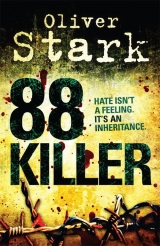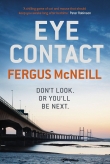
Текст книги "88 Killer"
Автор книги: Oliver Stark
Соавторы: Oliver Stark
сообщить о нарушении
Текущая страница: 21 (всего у книги 28 страниц)
Chapter Seventy-Seven
Apartment, New York
March 13, 12.14 p.m.
The killer lay on his bed holding a small fob with two keys in his hand and twisting them in the light. He smoked a cigarette and watched the smoke twirl above him. He was thinking about his next steps. His eyes flicked to the right. There was a map of New York City on the wall. He had marked each kill with a dot. Around his tour of duty was a thick black line. He knew what had to be done, but it wasn’t enough. He put the two keys into his top pocket.
This was what it felt like, at the end of things. He knew the end was coming, but it needed to be on his terms, not theirs. He sat up and poured himself another drink. He took a sip, swilled it around his gums, then swallowed. Things had changed now, people were getting close. The children were still alive. That was a mistake. He didn’t like leaving traces and the children could identify him. It cut deep, making mistakes like that. It was unacceptable.
The problem was Harper. Since he’d taken over the investigations, things had blown up all over town. The news was full of the shootings. The cops were all over his area and the Jews were walking in twos and avoiding going out alone at night. Harper was good. Harper had pieced together the attack on the children. Somehow, he had known about it. How was that?
Harper made links and connections that other cops didn’t. Other cops were dumb and mindless. Harper had clarity, he looked sideways, he knew how to think. Harper was dangerous. The killer dragged hard on his cigarette and blew the smoke out fast. A haze of blue in front of his eyes. He needed a paradigm shift. He needed to change the nature of the attacks. Patterns were what cops looked for.
The Capske shooting had thrown them off the scent and given him time. It had allowed him to tour undisturbed, to kill again, to feel their subservient hands on his feet. Glass and Cohen lying in water or flat on cold ground, a ribbon of blood from the neat wounds. An execution or a re-enactment? He blew out smoke again. He couldn’t afford another attack in the street. He needed something more substantial.
He thought about the vigil. It would be a cut right at the heart of things. But how? How to do it and how to humiliate Harper? He just had to work out a plan. The sunlight broke through a cloud and shot through his dirty window. He saw the dense blue smoke drifting in thin waves across the room, watched them for a moment – then suddenly the idea was there, in the room with him. He felt a sense of calm, as if he had finally found the door out of a prison.
The river was only half-crossed but there was no going back. His hands were thick with blood, but the species still lived on. He moved quickly to the window and looked out through the dirt and grime. He wanted the world purified, simplified, made clean. Just like the forest glade, a cut of green earth and a future for himself and others like him. Perhaps he was too confident, too clear-minded. Sometimes, it was necessary to cloud people’s minds with fear. Maybe it was necessary to kill to feel nearer to God.
He thought about the other girl again. The girl he had loved who had ripped up the future. He saw her face in his mind’s eye. Let the emotion at her memory run over his tongue. Was it love or hate he felt? He wanted to see her. He wanted to love her. He wanted to hurt her. He had to go out. He had to clean up. You couldn’t kill them fast enough. There were just too many. He needed a way to kill more, to kill effectively, to get through them all.
Chapter Seventy-Eight
North Manhattan Homicide
March 13, 1.12 p.m.
Harper took some time to gather his thoughts, then brought the team back together. He looked exhausted from his sleepless night. ‘This has got to get going, now,’ he told them. ‘We’ve got four unsolved murders with a link between them and a kidnapped girl. We’ve got less certainty than ever. Let’s try to keep this organized.’
Denise looked across at Harper, indicating that she wanted to speak now. She wanted the team to understand the nature of the killer. Standing in front of them, leaning on the old table, she waited while he said to them, ‘Clear your heads. We have four crime scenes that all need re-investigating. Dr Levene is going to give us the heads-up on this killer, then we’re going to go back to basics. We’re missing something here.’ Harper raised his hand towards Denise. ‘Thank you, Doctor.’
Denise cleared her throat, pushed her hair back and took a breath. ‘The man we are searching for is not like you or me. He is a sociopathic murderer. He’s not concerned with his personal safety. He is solely concerned with carrying out his project. As I understand it, his project has a racial element. He uses original Nazi bullets, he makes his victims clean his boots and then shoots them in the head as they do so. He enjoys their submission, but his crimes have not, up to now, had an explicitly sexual element. That is not to say that they are not sexually motivated.’
Denise paused for a moment. ‘I happen to think that they do have a sexual element and by that, let me be clear, I mean that his control over his subjects gives him some kind of physical gratification. It may be that he is trying to stop his desires. These are crimes of hate to some degree, but they are not only crimes of hate. They are personal crimes that come from a powerful sense of inferiority that it is impossible for our killer to acknowledge. Our unknown subject believes he is hunting after Jews, after any Jew, but his victims are not just any Jews. I’ve thought more closely about the victims recently and they tell us something. Apart from David Capske, they follow a similar pattern. The women belong to a similar type. Look at this.’
Denise pointed at the women on the board. They all had different hair color, different faces. No one could see the connection. ‘I don’t get it,’ said Garcia. ‘They’re all different.’
‘Yes, they seem so, don’t they?’ Denise walked across to the boards and put the crime-scene photographs of each woman side by side. ‘Do you see it now?’ she asked.
The team stared at the three women. Esther, Becky and Marisa.
‘They’re all thin with long hair,’ said Mary.
‘Yes,’ said Denise. ‘That’s right, they’re all thin. He’s not just after Jews. He’s after a type. This is not just political, it’s personal.’
‘What about Capske?’
Harper replied. ‘I think that’s what the investigation has to ask itself. Why Capske?’
‘I think I might know why,’ said Denise. ‘Did you ever interview Lucy Steller? I’ve been feeling I’ve been missing something and it suddenly came to me. Abby Goldenberg was the type, but so was Lucy Steller. Thin, with long hair. Maybe he wasn’t after Capske, after all. Maybe he couldn’t get the girl he wanted, so he took it out on Capske. Maybe Lucy was his target. He’s full of desire and hatred for himself.’
‘What do you think, Eddie?’ said Harper. ‘You spoke to Lucy.’
‘It’s interesting. Lucy certainly fits the type. He was watching them both. Lucy said that. She was sure about that.’
‘Yeah, but Capske took her all the way home. He didn’t have a chance,’ said Harper.
‘So, instead, he followed Capske. Maybe frustrated with not being able to get to his target.’
The team seemed buoyed by the idea. They hadn’t had a lead for days and the new information seemed to open some doors.
‘I call it a psychological fingerprint,’ said Denise. ‘He’s leaving his ID all over these kills, we just can’t read it yet. But we’re getting closer.’
‘Let’s check it out,’ said Harper. ‘We’ve got to go back to Lucy. He could’ve been stalking her for a while and if so, then she might have seen him.’
‘And if she was a target…’ said Denise. She stopped. All eyes were on her. She wasn’t sure whether she should say it or not. She looked at the floor and then back up. ‘If she was a target, then she still is – and that means she’s possibly still in danger.’
‘We’re already on it,’ said Harper, pointing at three members of his team. ‘Let’s move!’
Chapter Seventy-Nine
Apartment, Upper East Side
March 13, 1.53 p.m.
Lucy Steller sat alone in her flat. She had been too scared to go out ever since the morning after David’s murder. She couldn’t forgive herself for falling asleep as he was being tortured.
She had slept in a warm bed, safe and comfortable as the man she loved was being tortured and murdered. She hated herself so much, she couldn’t bear to see or speak to anyone.
She took the razor, looked coldly down on to her own arm and steeled herself. The razor lightly touched her arm, a delicate but unmistakable sting. Not pain, but painful. She pulled the razor across her arm, watching the trail appear – a red tail to a steel mouse. The stinging deepened and intensified. She raised her hand. It was a cycle. She would cut, then the white fear would come and she’d feel depressed, scared and lost. Then she would have to cut until the fear stopped. Hurt made sense. The line of blood collected into a glistening red ball on her wrist. The tipping point was reached and the ball of blood rolled down her arm. Seeing herself bleed, she relaxed a little, a physical relief from her emotional pain.
Her hand moved down to the cut; she drew a second line across the first line, forming a red cross. The pain from the second line mingled with the dying pain from the first. Emotional pain was layered too. Layers and layers of harmonic pain, shouting, screaming, grieving, crying.
Blood was dripping off both sides of her arm. She cut again as the pain dulled. Each time, the dulling came more quickly, until Lucy was slicing herself every few seconds. She continued for minutes. A hundred bloody cuts, a hundred red lines spreading out in every direction like marks on a butcher’s chopping block.
Then it stopped. The tension and anger vanished and she was left sitting on the small couch, staring ahead, her pale face gaunt and drawn from a lack of food and sleep and iron.
Chapter Eighty
Apartment, Upper East Side
March 13, 1.58 p.m.
Outside in the street, the man looked up. He knew she lived on the fifth floor and counted until he imagined where she was sitting right now. He walked up the stone stoop and took out the key. He had had the key ever since he’d taken Capske out. The cops hadn’t noticed that one of the keys on his fob was missing. Subtlety was lacking in their investigation. He pushed it into the lock and turned it. The lock was on some kind of electronic catch and the bolt buzzed and released. He entered the lobby.
The building was old and crumbling, with post-boxes half-torn off or covered with graffiti. It smelled of mold and damp. The panels to the basement door were smashed out and the lower-ground laundry odors mixed with the heat from the apartments and the whiff of old carpets.
He didn’t like the dirt or the idea that he was breathing in spores. He moved toward the stairs and started to climb. The key to the apartment remained in his hand as he ascended to the fifth floor. He took a look over his shoulder and felt the excitement rising through his body, lifting him up with the sensation of flying.
In his coat pocket was his World War Two German Luger. A fine piece of engineering and beautiful to hold, the semi-automatic Pistole Parabellum 1908, to give it its correct name. He pulled the Luger out of his pocket as he reached the floor, took out an 8-round magazine and pushed it into the grip. Taking the toggle-joint between his thumb and forefinger, he pulled it back, then let the breechblock snap back into place, with a metallic clunk. A new cartridge was now waiting in the chamber. Lucy’s bullet was primed.
Chapter Eighty-One
Apartment, Upper East Side
March 13, 2.09 p.m.
The street Lucy Steller lived on was quiet and tree-lined. There was a row of shops and that afternoon people were peaceably walking along either side of the street. A moment later, a distant squawk of sirens could be heard getting closer and closer. Soon, the sound was screeching and a few people on the street turned to look.
Eight police cars turned into the street and drove hard down towards them. The first car braked and skidded, then the other seven cars followed suit. Down the street, in a car, a man observed them closely. He checked his watch.
The people in the grocery store watched as every car door opened and several plain-clothed detectives got out. Three of the cars were squad cars and uniformed officers started to form a boundary.
The men and women hurried across to a building and in a moment they’d all disappeared. Only two uniformed officers stood on the street, telling the public that they ought to stand back.
Harper was first at Lucy Steller’s door. He knocked, lightly at first. Then harder and finally, he was shouting her name. There was no response. ‘Okay, break the door,’ he said.
Two cops moved in with the battering ram. They hit the door once and the door jamb split. Harper pushed it open. He walked in.
‘Lucy!’ he called. There was no reply, but there was a smashed cup on the floor and an overturned table with a broken leg lying by the couch.
Harper knelt and touched the cup with his palm. ‘It’s still warm,’ he said.
‘Signs of a struggle,’ said Eddie. ‘We’re too late.’
Harper led the cops through the rooms. ‘Just look around. Anything you can find that might tell us something.’
Denise looked at the bookshelves. There was a row of diaries going back for several years, but two were missing. She ran her finger over the year on each diary. ‘Harper, two of the last three years are missing.’
‘Is that significant?’
‘They might be somewhere, but if the killer is targeting her, maybe he thought she’d have information. He’s getting very worked up, Harper. He’s trying to close down anyone with knowledge of him. She might have seen him stalking her.’
Harper moved to the desk. ‘The PC, take a look at this,’ he said. ‘There’s no hard drive – another place that she might leave evidence.’
Harper then glanced at the small hook by the door. He walked across. ‘How do you think he got in?’
Denise raised her head. ‘Either he just rang the buzzer or he had a key. Point is, what’s he going to do next?’
Chapter Eighty-Two
North Manhattan Homicide
March 13, 3.51 p.m.
Harper and the team left Crime Scene at Lucy Steller’s apartment. Harper called Blue Team together.
‘The coffee cup on Lucy Steller’s floor was still warm, which means that the killer was only a few minutes ahead of us,’ said Harper. ‘He’s coming out of the shadows. We should have protected this woman. She’s in real danger now.’
‘We didn’t see it coming. It’s a form of escalation,’ said Denise. ‘He’s trying to cover his tracks and he’s likely to try something more dramatic, something that gives him a bigger thrill than the kills.’
‘It’s hard to think what,’ said Greco.
‘We need to get going. We’ve got the vigil at Union Square to help with. The killer risked himself with Lucy, just like with the children. That means Lucy holds a clue to his identity, right?’ The cops nodded. ‘I’m going to leave Denise and Ratten here to go through everything from Lucy’s apartment. My guess, based on the stolen diaries and hard drive, is that she either knew who he was or met him in the last two years. So we need to know when it was, who he was and how they met.’
Denise nodded.
Harper then pulled up the map of Union Square. Eddie looked at it. ‘How the hell are they going to police that place?’
‘It’s going to be hard, that’s all we know,’ said Harper. ‘But it’s going to be peaceful. We’re there with Hate Crime Unit, just to keep an eye out. We don’t know that he’ll try anything, but he may enjoy turning up, so we’re videoing every entrance and exit. We’ve got face recognition software, and Heming’s face plus every face that Hate Crime has on record is now in the database.’
‘How does it work?’ asked Garcia.
‘Mathematics,’ replied Ratten. ‘Although you’re pretty, your face can be reduced to a number of measurements and ratios. The software calculates those measurements for every face it sees and if it matches anything in the databank, it’ll flag up.’
‘So if Heming or any known neo-Nazi turns up, they’ll be flagged and arrested.’
The team were just taking in the information when Captain Lafayette flew through the door. He was red-faced and full of excitement. ‘Listen up, the press have just had another communication from the 88 Killer. A new email.’ He held up a piece of paper. ‘He emailed all the newspapers again. The boys downstairs have traced it, it’s no fake. This comes from the same account.’
‘So, what the hell does he say this time?’
Lafayette eyed the room. ‘You’re not going to like this, not one bit.’ He drew the email in front of his eyes. ‘Police Press Notice: March 14, Union Square Park. During the night-time vigil in Union Square Park to remember those killed in the recent spate of attacks on the Jewish community, NYPD detectives discovered the dead bodies of five Jewish citizens. As the vigil went on, the suspect known as the 88 Killer executed five people. Senior police officials are at a loss to explain how the killer managed to fool the NYPD and kill in such a high-security operation. In the words of one bystander: “The government and the police stood by watching, while someone walked in and killed five innocent people.” ’
‘How seriously are we going to take this?’ said Lafayette. ‘Every news station in America is going to be down in Union Square after they receive this. He’s just set his stage.’
‘Can he do it?’ said Denise. ‘I mean, is it possible?’
‘Can we evacuate?’ asked Harper.
‘It’s too late and the Mayor thinks it will be a PR disaster to pull the plug on this.’
‘Then what?’
‘We’ll have police on every square inch of the place,’ said Lafayette.
‘And what if it’s a bomb?’ said Kasper. ‘Then what do we do?’
The team looked at each other. ‘Then we’ve got to hope that the sniffer dogs will find it. We’re going to have to scramble everyone – Counter-Terrorism, the army, the Feds – on this. This is going to be big.’
Harper took the piece of paper. He read the email and passed it to Denise. ‘It’s a challenge,’ he said. ‘I don’t like it. He’s already three steps ahead.’
Lafayette looked at Harper. ‘Can he do it?’
‘Anything can be done,’ said Harper.
‘Not with the whole of the NYPD on his case.’
Harper shook his head. ‘You’ve just had a message from a killer saying he’s going to make fools of the whole government as we all pay our respects to the dead. You think we can police this? There’s going to be thousands and thousands of people out there and we’ve got to find one determined and clever individual. He can do anything. We don’t have a chance. Captain, you need to speak to the Commissioner and tell him that if he’s not going to stop it, then he needs to prepare for the worst.’
Chapter Eighty-Three
Auto-parts Yard, Brooklyn
March 13, 4.18 p.m.
Karl Leer had sourced the vehicle two weeks earlier. He had found a decommissioned Auxiliary Support Unit Police Truck that was lying unwanted and unloved in a scrapyard.
As requested, Leer had checked out the engine and cleaned it, making sure that the paintwork was neat and without too many obvious scratches. Then he had left the truck outside the garage behind his workshop.
And now the killer was standing next to the big, dark blue truck. He walked around it and looked inside. He opened the back doors: it seemed to be the right size and would suit his plan. He checked over the outside. Because it was one of the NYPD Auxiliary Unit’s trucks, rather than one of the official NYPD trucks, it still had its markings. That was essential. It had to look like the real thing and it would because it was the real thing.
The killer jumped inside and started to pull everything out. He wanted space to hold people. He had a plan and the plan was to make a fool of the NYPD and to try to kill more Jews than he had been able to so far. Shooting people one by one would take too long, but it was more than that. It was affecting him. He wanted more dead. He wanted a bigger impact. The hunger was in him again and he couldn’t control it.
Nor could he afford to let failure happen again. Once the truck was emptied, he got in the back with a tube of sealant. He sealed up any and every joint and hole with silicon. Then he added rubber all around the two back doors in order to create an airtight unit.
He walked back to the lock-up and found a long piece of hose. He measured the length of the truck from the bottom to the top and then halfway across the roof. He cut a length of hose and then found a ladder. He climbed on to the roof and for the next half-hour welded all the air vents shut apart from one. On to the last vent he welded a short metal nozzle. Then he attached the hose to the nozzle and tied it firmly in place with wire. He ran the hose across the roof, taping it down, then ran it down the side of the van.
Finally, he took the other end of the hose and, using another nozzle, attached it to the exhaust. He spent a few more minutes ensuring that each end of the hose was in place, and then painted the hose blue so that it was not so conspicuous. The whole operation lasted under three hours. He stood back and declared himself pleased. Then he went to the engine and switched it on. He let the engine rumble on and he climbed into the back of the van, leaving the door wide open.
Soon enough, exhaust fumes started to fill the space and he began to cough. He jumped out of the truck. This was the way forward. This was much more efficient.








